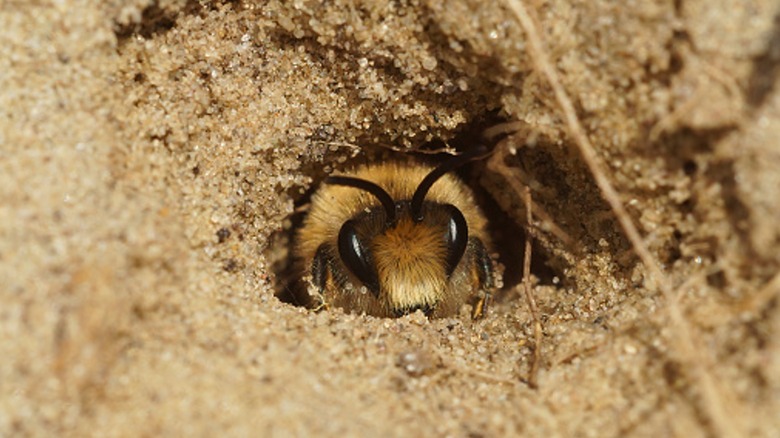As your neighbors start their regular fall cleanup routine of raking and bagging their leaves, you might find yourself reaching for your yard tools to do the same. But what if you are harming your yard’s ecosystem in the process? Not only are fallen leaves an excellent source of nutrients for your lawn, but they also offer food and shelter for all kinds of wildlife. From tiny bees that overwinter underground to turtles who will happily take care of your slug population in the spring, raking your leaves destroys their winter habitat. Further, if these insects aren’t present in your yard, the birds won’t have food to snack on during the winter months, leaving them without the nutrients they need.
A perfectly tidy lawn is just that: perfect. This kind of environment may look pretty, but from the perspective of wildlife, it’s sterile. When the days start to turn cold, these creatures will look for a safe place to overwinter. By the time you rake your leaves, they may have already taken refuge in your yard. If you put those leaves in a bag and send them off to the landfill, you are removing the protective covering that native wildlife and insects in your region require to survive in harsh weather.
How leaves benefit beneficial insects

Many different species of insects live in or just above ground level and need insulation to survive. As we mentioned, some types of bees burrow into the soil to spend the winter. Of course, if you grow a garden, you’ll want these vital native pollinators around to help your plants produce food. Along with bees, some of our favorite summer insects, fireflies, also overwinter underground. So by leaving some leaf litter to protect them, you’re more likely to be rewarded with a stunning display of glowing lights next year. We can’t forget the creatures that help break down nutrients in the soil to make them available for our plants to thrive. Earthworms, pill bugs, and other underground insects can keep working through the winter if they have some insulation.
There are also other beneficial insects like butterflies and moths that overwinter in leaf litter as chrysalids and cocoons. Further, if you find yourself in a battle with aphids every year, you could benefit from leaving the leaves to give ladybugs a place to hide out until next spring rolls around. These beneficial insects will help you control your aphid populations, which could benefit your growing garden.
How leaves benefit pest-eating reptiles
Insects aren’t the only ones who need a place to lay low when the temperatures drop. Scurrying salamanders, box turtles, and even friendly snakes benefit from the extra insulation that’s provided by a layer of leaves. We know that reptiles can give some people the heebie-jeebies, but they offer excellent biological pest control. Garden snakes will take care of a wide range of insects and small rodents that can do big damage to your home, landscaping, or vegetable garden. If you have problems with slugs or snails decimating your hostas or lettuce, box turtles and toads may be your new best friends.
Salamanders are so fun to watch. Of course, they’re adorable (and a little less scary than snakes), but they also eat some of the worst pests in the garden. If you have a pond or water feature, salamanders can help control your mosquito population by consuming their larvae. They also eat spiders, slugs, and flies, so keeping a spot for the salamander to overwinter will pay off throughout the warmer months.
How leaves benefit birds
2009fotofriends/Shutterstock
We cannot discuss creating an ecosystem that supports wildlife without talking about birds. Many types of common birds that overwinter in your region rely on more than bird feeders to survive the cold. Cardinals and tufted titmice are known to eat their share of caterpillars. Chickadees are particularly reliant on insects in the winter, with bugs in leaf litter or in the bark of trees making up over half their winter diet. Leaving the leaves provides food for a variety of feathered friends, and when the dark, cold days are upon us, it’s nice to attract birds to our yards during the winter season.
When we consider that we are leaving our leaves for the benefit of not only beneficial insects but also the birds that eat them, this can seem a bit harsh. However, that’s the purpose of an ecosystem that supports wildlife. The natural circle of life needs to be aided everywhere, even in our yards. Clearly, we cannot protect everything from nature, but we can make sure that we are doing what we can to support wildlife in our space.
What to do instead of raking your leaves
Bild-Wasser/Shutterstock
Just because you are not raking your leaves and sending them to the landfill doesn’t mean you have to be the lone house on the street with an untidy yard. There are a few alternatives to raking that support wildlife without adding more methane-creating garbage to the landfill. In fact, if you have several mature trees, leaving all the leaves could damage your lawn. If the layer is too thick, it becomes a wet, suffocating mat that can kill your grass and anything under it. In this situation, the best solution is to clean up only some of the leaves. You could allow a few natural spots in your yard to pile up with leaves and provide the protection we have discussed to support all these beneficial creatures.
Instead of raking up your thick layer of leaves, it is better to turn it into mulch with the help of your lawn mower. You don’t need special equipment or even a mower that states specifically that it is a “mulching mower” to complete this task. The idea is to break up the leaves into small-enough pieces so that they don’t suffocate your grass while simultaneously still offering soil-level insulation. By spring, the leaves will have decomposed, just in time for those overwintering insects and reptiles to emerge. The nutrients in the leaves will feed your soil, providing you with a lush yard that isn’t a danger to wildlife.
